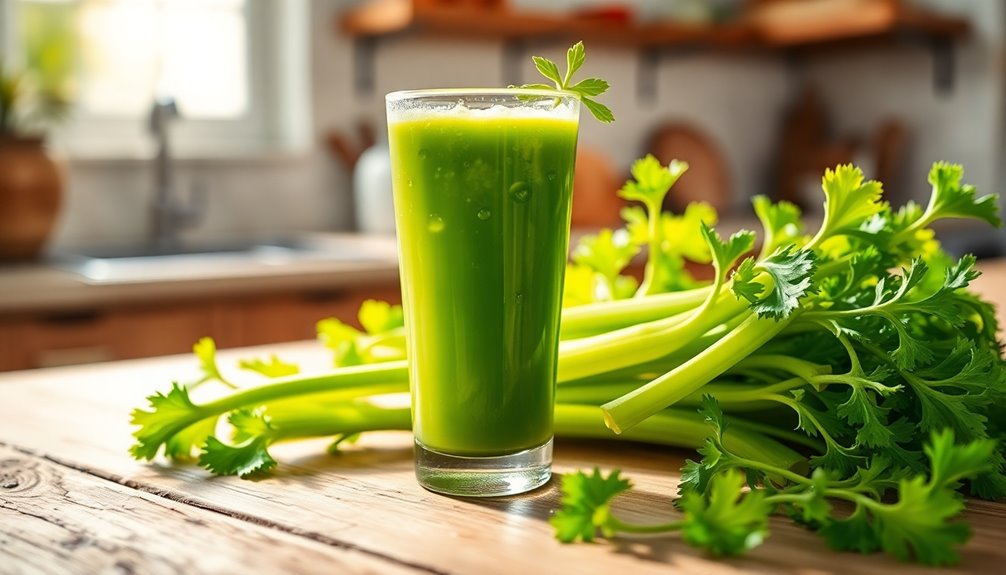You'll be surprised to learn that celery juice only contains 33 calories per 8-ounce serving! This low-calorie drink is packed with essential nutrients like 99% of your daily vitamin K and 19% of vitamin C. It's a perfect hydrating option that won't sabotage your diet. Just remember, while it's beneficial, there are some potential drawbacks too. Stick around to find out more about the health benefits and best ways to enjoy this revitalizing juice!
Key Takeaways
- Celery juice contains only 33 calories per 8-ounce serving, making it a low-calorie beverage choice.
- It retains essential nutrients, providing 99% of daily vitamin K and significant amounts of vitamin C and potassium.
- Juicing celery removes most fiber, which may impact digestive health despite its nutritional benefits.
- The drink has a glycemic index of zero, making it suitable for those monitoring blood sugar levels.
- Caution is advised due to its sodium content and potential interactions with blood thinners; consult a healthcare provider if needed.
Celery Juice Nutrition Overview

Celery juice is a revitalizing, low-calorie drink that packs a nutritional punch. With a calorie count of just 33 calories per 8-ounce serving, it's a perfect low-calorie beverage for those mindful of their intake.
This juice is rich in essential nutrients, delivering 99% of your daily intake of vitamin K, along with 19% of vitamin C and 14% of potassium. While the health benefits are impressive, it's crucial to recognize that the juicing process removes most of the fiber content, which can affect digestive health. Additionally, celery juice has a glycemic index of zero, making it a great option for anyone monitoring blood sugar levels. Overall, it's a nutritious choice that complements a balanced diet. Moreover, celery juice has anti-inflammatory properties that can further support overall health.
Caloric Content and Comparison

When considering beverage options, celery juice stands out for its low caloric content. With only about 33 calories per cup, it's a fantastic low-calorie beverage choice.
In comparison, a cup of chopped raw celery contains just 20 calories, but juicing can slightly increase the calorie count due to concentration.
Celery juice is primarily water, which contributes to its low caloric content and minimal carbohydrates. Even though it's low in calories, it retains valuable vitamins and minerals, offering 99% of your daily intake of vitamin K, along with significant vitamin C and potassium. Additionally, celery juice is known for its hydration and electrolyte balance benefits, making it a great choice for staying refreshed.
Health Benefits of Celery Juice

Although you might think of celery juice as just a rejuvenating drink, it offers numerous health benefits that can enhance your overall well-being.
With only 33 calories per cup, it's a low-sugar option that hydrates while keeping your calorie intake in check. One serving provides an impressive 99% of your daily vitamin K, essential for blood clotting and bone health. The vitamin C content supports your immune system and aids in wound healing.
Plus, celery juice is packed with antioxidants and phytonutrients that may reduce inflammation, lowering the risk of chronic diseases. Additionally, its high water content helps support hydration, making it a refreshing choice for overall health.
While the fiber content decreases during juicing, it still promotes digestive health and can assist in weight management by helping you feel fuller for longer.
Potential Drawbacks and Side Effects

While celery juice boasts impressive health benefits, it's important to contemplate some potential drawbacks and side effects.
Despite having only 33 calories per 8-ounce serving, the sodium content is notable at 189 mg per cup, which might concern you if you're on a low-sodium diet.
Drinking too much celery juice can lead to gastrointestinal upset due to its low fiber content, essential for digestive health. Additionally, some individuals may experience allergic reactions, resulting in skin or digestive issues.
If you're on blood thinners, be cautious since celery juice is high in vitamin K, which can interfere with these medications. Raisins can cause acute kidney failure in dogs, so it's best to avoid consuming celery juice in high quantities alongside other foods that may affect your health.
Always consult your healthcare provider to understand the potential drawbacks and side effects before making it a regular part of your diet.
Best Ways to Enjoy Celery Juice

If you want to maximize the health benefits and flavor of celery juice, consider preparing it fresh and consuming it within 24 hours. Freshly made celery juice not only retains its maximum nutrient profile but also ensures a vibrant taste that can enhance your overall enjoyment. However, it’s important to be mindful of your body’s response, as some individuals may experience a short-lived digestive upset, potentially linked to the celery juice diarrhea duration. To mitigate any adverse effects, start with small servings and gradually increase your intake while monitoring how your body reacts.
Here are some best ways to enjoy it:
- Mix celery juice with other vegetable or fruit juices for a revitalizing blend.
- Add a squeeze of lemon or lime for extra vitamin C and flavor enhancement.
- Incorporate celery juice into smoothies to boost hydration and nutrient profile.
- Drink unstrained celery juice to retain some fiber in celery, enhancing its health benefits.
- Experiment with different ingredients to find your favorite combinations.
Frequently Asked Questions
How Many Calories Are in Celery Juice?
When you ask how many calories are in celery juice, you'll find it surprisingly low. A cup of celery juice contains just 33 calories, making it an excellent choice if you're watching your calorie intake.
It has minimal fat and a low carbohydrate count, plus it won't spike your blood sugar.
Just remember, while it's low-calorie, juicing removes a lot of the beneficial fiber found in whole celery.
What Happens if I Drink Celery Juice Every Day?
If you drink celery juice every day, you'll enjoy a revitalizing, low-calorie beverage packed with essential nutrients.
You'll get a good dose of vitamin K, vitamin C, and potassium, plus it can help keep you hydrated and may reduce inflammation.
However, be cautious—too much could upset your stomach due to its sodium content.
Does Drinking Celery Juice Help You Lose Weight?
Picture a revitalizing glass of bright green celery juice, glistening in the sunlight.
While drinking it can support weight loss, it's not a magic solution. The low calorie count and zero glycemic index can help you manage your intake, but it won't replace a balanced diet.
Pairing it with whole foods and exercise is key. So, enjoy that juice, but remember, it's just one piece of the weight loss puzzle.
What Are Three Disadvantages of the Celery Juice Diet?
If you're considering the celery juice diet, be aware of its disadvantages.
First, you'll miss out on essential fiber, which can leave you feeling hungrier and disrupt your digestion.
Second, the high sodium content mightn't suit you if you're watching your salt intake.
Finally, relying solely on celery juice can lead to nutritional deficiencies, as it doesn't provide enough calories or nutrients compared to whole foods.
Balance is key!
Conclusion
You might think celery juice is just a low-calorie drink, but its real impact on your health could surprise you. As you sip that invigorating glass, remember it's not just about the calories; it's packed with nutrients that can boost your wellness routine. Coincidentally, those benefits might just align perfectly with your goals. So, the next time you pour yourself some celery juice, relish the thought that you're doing something great for your body!
Cindy thoroughly researches juicing trends, techniques, and recipes to provide readers with practical advice and inspiration. Her writing style is accessible, engaging, and designed to make complex concepts easy to understand. Cindy’s dedication to promoting the advantages of juicing shines through her work, empowering readers to make positive changes in their lives through the simple act of juicing.











